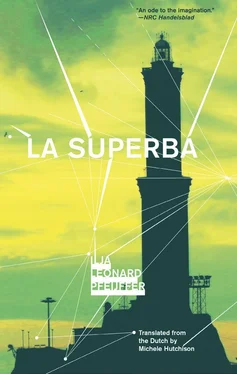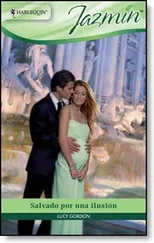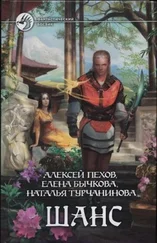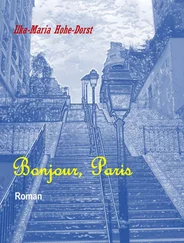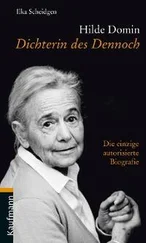When I reached the corner of Via della Maddalena she was nowhere to be seen. She was quicker than I. She’d probably run farther downhill to Vico dei Corrieri or Vico Lavagna. But perhaps that was too simple. I hazarded a guess that she’d count on me being that simple. In that case she would have gone upward to the parallel alleyway, Vico del Duca, and then she’d probably hide in that narrow alley called Vico Trogoletto that crosses it, out of sight of Via della Maddalena. I went up to the next alley that ran parallel to Vico Angeli, Vico Salaghi, but I didn’t see her in Vico Trogoletto. I walked down along Vico del Duca, and when I came out on Via della Maddalena, I saw her peering around the corner from Vico Angeli. She saw me and fled along Via della Maddalena. She took the first left. I ran as fast as I could in pursuit. She’d committed an error. Obviously she didn’t know the alleys in this neighborhood as well as I did. The first left was Vico Malone and that was a dead end.
35.
She stood with her back to the alley against the fence blocking her exit. “Please,” she whispered. “Go away.” She hid her face in her hands. “Please go away. I beg you. It’ll be better for everyone.”
“I’m not going to hurt you.”
“Yes you will. You’ll hurt me. And you’ll hurt yourself, too.” Her shoulders shook. She was crying. I cautiously laid a hand on her back. “Don’t touch me!” I pulled my hand back in shock. There had been something strangely familiar about that touch.
“I don’t want anything from you,” I said gently. “I just want to see your face. I want to know who you are. And then I’ll go. I promise you. If you want, I can even pay for it.”
When I said that, her crying increased dramatically in volume. She crumpled. Her whole body shuddered. I was overwhelmed by a warm, salty flood of pity. I had an almost irresistible urge to softly take her in my arms, but I didn’t dare touch her again. I didn’t know what to do. I rocked on my heels. What should I do? Perhaps she was right. Maybe I should just go away. What was I doing? I’d cornered a slender white prostitute wearing a red wig in a dead-end alley off Via della Maddalena. All that was missing was a pimp coughing politely with a knife to my back and asking why I was scaring the wits out of his herd. And then there was still the possibility, however improbable it might be in this neighborhood, of police patrols and being charged with harassment or worse. As if I wasn’t in enough trouble already. Perhaps I really should leave her alone. But something was stronger than I. I had to know who she was. It couldn’t be a crime to want to see her face, could it?
“You’ll be making the biggest mistake of your life,” she whispered, “if you don’t go away immediately.”
“I don’t believe you. But if it is so, I’m prepared. And what kind of damage can seeing your face cause to us? Unless you’re so pretty I’ll never get you out of my mind, which is a possibility I’m not ruling out, I don’t think we’re really capable of causing each other pain.”
“You don’t know what you’re saying.”
“Wouldn’t be the first time,” I said. But she didn’t laugh.
“I’ve warned you, Leonardo.”
“How do you know my name?”
She didn’t reply. She straightened up proudly, still facing the fence, and pulled off her red wig. Long black hair flowed down her back. And then she turned around.
36.
Processions of penitents marched through the depopulated cities. Anyone still strong enough to knead dough or work the bellows for the blacksmith’s fire abandoned their ovens and anvils to dress in camelhair and walk barefoot, praying and wailing, through the streets among the stinking bodies covered in suppurating boils and black blotches. In some cities, people were so desperate to suffer sufficiently and pay penance that the streets were scattered with thorns, shards of glass, and glowing coals, replenished on a daily basis by the authorities. Anyone discovering a swelling or a black patch on their skin threw themselves screaming onto one of the many man-sized funeral pyres, the name of the one true God on their lips. Young widows smeared their young breasts with the fresh ash of their husbands, fathers, sons, and lovers. The sound of every city in Europe was of lamentations directed at the heavens. The smell was the odor of putrefaction and burning human remains.
Processions of penitents marched across the depopulated countryside. Long corteges of penitents dressed in jute and ash proceeded through fields of corn that were no longer harvested, cows that were no longer milked, and sheep that were no longer tended. They walked under cloudless skies across blistering hot gravel in the scorching midday sun and slept under open skies on bare rocks in the cutting cold of the night. They trampled every flower. At every blackberry bush, fights broke out over who was the greatest sinner, who then would be first to be allowed to wallow in the sharp thorns. They carried whips with heavy knots in the ropes with which, sobbing, they flailed their own backs until they bled. They pulled their own hair out with their bare hands. They broke the bones in their hands and feet with sharp, abrasive rocks. If an occasional villager offered them alms or a morsel of bread out of pity, they’d angrily kick him lame for having wanted to lessen their suffering.
All Europe had fallen prey to despair, desperation, apathy, and, most of all, a crippling sense of guilt. The Black Death testing all the Christian kingdoms couldn’t be anything other than God’s punishment. And that punishment was so unimaginably heavy that immense sins must have been committed for the Almighty to bring down such devastating wrath on mankind. If the epidemic was God’s punishment, the only remedy was to pay penance. And given the severity of the punishment, penance couldn’t be severe enough. And it didn’t help. On the contrary. Ironically enough, the processions just helped to spread the illness farther afield. And because they didn’t help, the self-castigations became more and more extreme, the processions of penitents longer, their journeys farther, until there was nothing left but a pure, undiluted, silent sense of guilt, that, although it was unbearable, could only be borne.
37.
That’s pretty much how I felt when I saw her tear-stained face. She was right. It might be the biggest mistake of my life, wanting to know who she was. It hurt more than I can say to see her in this situation, and I could see that it hurt her immensely to be seen here in this situation. The circumstances completely unnerved me. Thoughts and feelings tumbled over each other like shards of a large mirror that had been smashed to smithereens with the brutal blow of a sledgehammer. If I’d come across her somewhere else after all this time, in a quiet, innocent place, I would have become unsteady on my legs. But seeing her here again in a dead-end side street off Via della Maddalena and realizing that she was no chance passerby but was working the neighborhood with her suggestive, slightly-too-short miniskirt and her torturously attractive legs clothed in the kind of stockings questionable men find exciting, and seeing how she looked at me with tears in her eyes, beyond pride or embarrassment, as though she were standing naked before me, showing me her suppurating wounds because I had insisted as much, set off a cacophony of overwhelming emotions inside me that rendered thought impossible. And all those squeaking and creaking emotions that tried to crowd each other out of the foreground were drowned out by a single loud keynote that swelled increasingly until I could hear nothing else — and that was guilt. Although, objectively, at a different place and a different time, one might come up with a few sensible arguments to put that feeling in perspective, there, at that moment, in Vico Malone, I was overwhelmed by the feeling that it was my fault I was here, that she was here, that everything was like this, and that it was my monstrous fault that the most beautiful girl in Genoa, who was made of different stuff than what girls are usually made of, found herself forced to offer her fragile body to every slobbering old letch who had an itchy cock in his trousers and a fifty in his pocket. I broke.
Читать дальше
